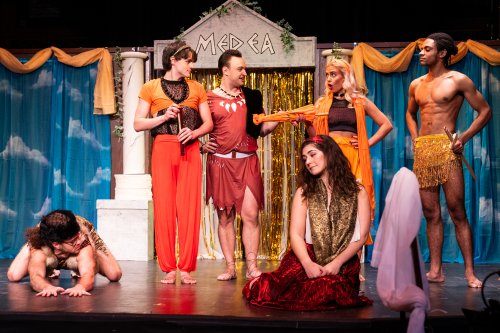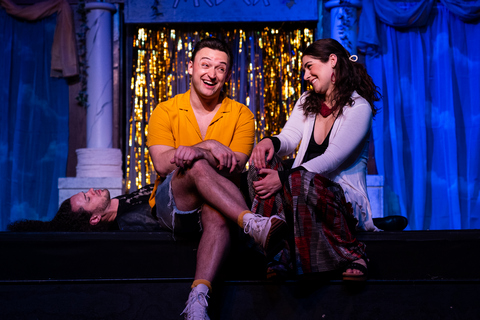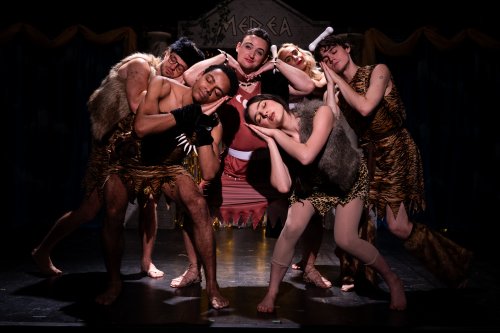Medea: A Musical Comedy
While not for everyone, it is definitely for people who like fun, inventive, over-the-top, and somewhat topical productions.

The company of John Fisher’s “Medea: A Musical Comedy” at the Actor Temple Theatre (Photo credit: Ian McQueen Photography)
Once upon a time, there was a fleece of gold in a far-off land. It was protected by magical spells and creatures to keep people away. A sorceress in a nearby kingdom had special powers to block things that protected the fleece. Her name was Medea, and the Greek poet Euripides wrote a play about her. The play has been produced in hundreds of different versions and interpretations for over 2000 years, but never like Medea: A Musical Comedy.
“Medea, Medea, I just met a babe named Medea,” is not a song from this wildly inventive, funny parody of Euripides tragedy Medea, but it could be. John Fisher’s show Medea, A Musical Comedy is nearly 30 years old but still has a freshness and bounce that belies its age. This production is not exactly a revival, but a restaging of a show with a robust and successful production history, and it mainly works. While it is not a show for all audiences, it is definitely for people who like fun, inventive, over-the-top, and somewhat topical productions.
Fisher directs a solid ensemble through a production of Medea that is a spoof of a college production with a gay man in the role of Jason and a feminist as Medea. It takes place from the last days of rehearsals to opening night. It is a play within a play with a romantic entanglement between the actor playing Jason and the actor playing Medea. It is amazing that with all the different elements of two storylines being played out the show works as well as it does.

Ryan Borgo-Christian and Laura Pachnos in a scene from John Fisher’s “Medea: A Musical Comedy” at the Actor Temple Theatre (Photo credit: Ian McQueen Photography)
The show opens with Paul (Ryan Borgo-Christian) on stage as Jason, giving a bit of background of the story and the timing of the current play. The narration leads into an opening number, “Colchis, Colchis,” sung by a group that turns out to be the crew of Jason’s ship. The song is a sendup of the song “New York, New York” and establishes a gay theme to the show. Paul continues his narration, filling in the rest of the storyline and introducing Elsa (Laura Pachnos), who, as Medea, sings a lament, to the tune of “Somewhere Over the Rainbow,” about her desire to leave Colchis. The number ends with a mashup of the two songs as everybody exits the stage. Pachnos perfectly inhabits Elsa and gives Medea a feminist edge that rankles the director during rehearsals and leads to an interesting and chaotic ending to the show.
The spoof storyline being acted out is a solid approximation of some amateur productions, with over-the-top acting, mugging to the audience, and missed cues. Added to the chaos of the rehearsal are the actors who are also members of the production crew, so Gabe (Anthony Chavers) is not only the costume “mistress” and carpenter, but is also Aetees, King of Colchis, and in the off-stage story the ex-lover of Paul. Hunter Hope Barnett is not only the choreographer but also plays Jane, Aphrodite, and Eros. And then there is the music director Corey, who repeatedly clashes with the director and plays a bunny in one scene. He is really Bobby Weil, the actual musical director and keyboardist.
Chavers gives an excellent portrayal of an emotionally fragile man still in love with his ex-partner, the leading character he must perform with. It is just one example of the characters mixing their off-stage feelings with their on-stage roles. This idea is played out with other characters and adds nicely to the chaos of the rehearsals.

The company of John Fisher’s “Medea: A Musical Comedy” at the Actor Temple Theatre (Photo credit: Ian McQueen Photography)
The second scene is pivotal in the way it sets up the characters for both storylines and for the chaos that is to follow. Paul, as Jason, introduces more of the players and, in the process, the cast members playing those characters. Borgo-Christian is stereotypically “swishy,” as one would expect from a gay “queen.” Emily Sweeney Goldstein is Kegan, who plays Phaedra, the sister of Aetees. Darius Mullens is Darryl, who plays Hippolytus, Phaedra’s son. Goldstein gives a solid portrayal of Phaedra lusting after her son, who Mullens plays perfectly as an empty-headed boy toy. In the parallel story, Mullens shows he is as empty-headed off-stage as on, when dealing with both the director and Paul.
An important character also appears in this scene, the director John. How perfect is it for John Fisher, the playwright and director, to play the director within his own production? Fisher is not playing himself but embodies an intense, frantic director trying desperately to shepherd a group of student actors into presenting his vision on stage. When he literally bursts down the aisle shouting at the actors on stage, it is a moment that defines the whole farcical structure of the show. Rather than dispelling the chaos and inanity of the actors, his presence incites more chaos bordering on rebellion.

Emily Sweeney Goldstein and Laura Pachnos in a scene from John Fisher’s “Medea: A Musical Comedy” at the Actor Temple Theatre (Photo credit: Ian McQueen Photography)
The off-stage story establishes the relationship between Paul and Elsa. Paul is attracted to Elsa, which confuses him since he has not liked “girls” since kindergarten. As he struggles with the idea that he may be turning heterosexual, Elsa is struggling with the whole thrust of the play, which has Medea as an evil bitch and child killer. In deciding who they are and what they will do, Elsa takes Paul to a “straight” nightclub, something completely alien to him. The lead singer of the band at the club is Cal, an unintelligible lead singer of a grunge rock band. Cal is perfectly embodied by Mike Kinzer with mannerisms associated with a punk rocker. Elsa, a friend of Cal’s, convinces him to participate in the musical, which he does as Apsyrtus, playing him like a punk rocker of ancient times. In the end, Elsa and Paul decide to change the structure of the play without telling anyone, and what they come up with is a perfectly tuned chaotic farce.
The set design by Danny Durr and the costumes are suitably tacky, and that is a good thing in this show. The off-stage costumes are more attuned to the time and place of the off-stage settings. Nilton Emilio’s lighting design works well in tracking the chaos of the rehearsals, with all the interruptions and ensuing chaos. Ethan Gueldenzopf, on drums, supports musical director Bobby Weil’s keyboards.
Medea: A Musical Comedy (through December 28, 2024)
Jon Zimmerman, in association with Edmund Gaynes
Actors Temple Theatre, 339 West 47th Street, in Manhattan.
For tickets, call 212-239-6200, or visit https://www.telecharge.com/Medea-A-Musical-Comedy-Tickets
Running time: 110 minutes without an intermission






Leave a comment